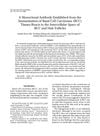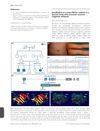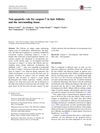 April 2018 in “Journal of Investigative Dermatology”
April 2018 in “Journal of Investigative Dermatology” The keratin network in mouse skin changes during cornification and affects the skin's protective barrier.
 April 2018 in “Journal of Investigative Dermatology”
April 2018 in “Journal of Investigative Dermatology” STIM1 is essential for sweat secretion.
 November 2023 in “The journal of investigative dermatology/Journal of investigative dermatology”
November 2023 in “The journal of investigative dermatology/Journal of investigative dermatology” Skin cells and certain hair follicle areas produce hemoglobin, which may help protect against oxidative stress like UV damage.
51 citations,
August 2013 in “The Journal of experimental medicine/The journal of experimental medicine” Loss of a specific protein in skin cells causes symptoms similar to psoriasis.
70 citations,
January 2014 in “International review of cell and molecular biology” Keratin proteins are crucial for healthy skin, but mutations can cause skin disorders with no effective treatments yet.
2 citations,
January 2020 in “Evidence-based Complementary and Alternative Medicine” Hataedock treatment improved skin health and reduced atopic dermatitis symptoms by enhancing the skin barrier and reducing inflammation.
 17 citations,
June 2012 in “Journal of experimental zoology. Part B, Molecular and developmental evolution”
17 citations,
June 2012 in “Journal of experimental zoology. Part B, Molecular and developmental evolution” Hair in mammals likely evolved from glandular structures, not scales.
9 citations,
July 2007 in “Journal of Investigative Dermatology” Claudin expression changes help the skin respond to injury.
7 citations,
February 2019 in “Veterinary medicine and science” An American Bully with a genetic skin condition improved significantly with specific topical treatments.
22 citations,
October 1996 in “Dermatologic clinics” Understanding intermediate filaments helps explain hair health and related diseases.
6 citations,
October 2020 in “Frontiers in cell and developmental biology” WWOX deficiency in mice causes skin and fat tissue problems due to disrupted cell survival signals.
 1 citations,
November 2002 in “Journal of dermatology”
1 citations,
November 2002 in “Journal of dermatology” The antibody created from BCC tissues reacts similarly to both BCC and hair follicles, suggesting BCC may come from hair follicle cells.
 March 1998 in “Journal of dermatological science”
March 1998 in “Journal of dermatological science” Protease Nexin-1 is found in human hair growth cells and is affected by male hormones.
5 citations,
November 2021 in “The journal of investigative dermatology/Journal of investigative dermatology” Wnt/β-catenin signaling is important for keeping skin cell attachment structures stable.
 21 citations,
July 2022 in “Orphanet journal of rare diseases”
21 citations,
July 2022 in “Orphanet journal of rare diseases” New treatments for ichthyosis, like protein replacement and gene therapy, show promise and may become standard care.
37 citations,
February 2005 in “Journal of Investigative Dermatology” Overexpression of SSAT causes hair loss and skin issues, but reducing putrescine can help.
 16 citations,
May 1992 in “Journal of Investigative Dermatology”
16 citations,
May 1992 in “Journal of Investigative Dermatology” Minoxidil sulfotransferase is a marker of keratinocyte differentiation and may play a role in hair growth.
 3 citations,
September 2005 in “Experimental dermatology”
3 citations,
September 2005 in “Experimental dermatology” The cornified envelope is crucial for skin's barrier function and involves key proteins and genetic factors.
 18 citations,
January 2020 in “Acta dermato-venereologica”
18 citations,
January 2020 in “Acta dermato-venereologica” Over 67 genes linked to ichthyosis help improve diagnosis and treatment.
 8 citations,
April 2022 in “The journal of investigative dermatology/Journal of investigative dermatology”
8 citations,
April 2022 in “The journal of investigative dermatology/Journal of investigative dermatology” Certain genetic changes in the LSS gene cause a rare skin and hair condition.
 39 citations,
January 2015 in “Annals of dermatology/Annals of Dermatology”
39 citations,
January 2015 in “Annals of dermatology/Annals of Dermatology” Three new types of a skin blistering disease were found, caused by specific gene mutations.
 May 2023 in “Frontiers in Endocrinology”
May 2023 in “Frontiers in Endocrinology” Thyroid disease can cause skin, hair, and nail problems, and treating the thyroid condition often improves these symptoms.
 November 2023 in “Frontiers in pharmacology”
November 2023 in “Frontiers in pharmacology” Drug repositioning offers hope for new, affordable treatments for a genetic skin disorder called ARCI.
13 citations,
December 1983 in “Canadian journal of zoology” Heterotypic cell contacts likely help hair matrix cells differentiate during mouse hair follicle development.
 23 citations,
December 2013 in “British Journal of Dermatology”
23 citations,
December 2013 in “British Journal of Dermatology” A new gene mutation linked to a skin condition was found in a Spanish family.
 6 citations,
August 2015 in “Journal of Molecular Histology”
6 citations,
August 2015 in “Journal of Molecular Histology” Caspase-7 has functions in skin and hair that are not related to cell death.
 August 2014 in “Springer eBooks”
August 2014 in “Springer eBooks” Certain gene mutations can weaken the skin barrier and, when combined with environmental factors, lead to eczema and severe itching.
136 citations,
April 2010 in “British Journal of Dermatology” Acitretin is effective for severe skin conditions but has significant side effects and requires careful monitoring.
 1 citations,
January 2015 in “Journal of nutrition & health”
1 citations,
January 2015 in “Journal of nutrition & health” Fish oil improves skin health in people with diabetes and high cholesterol.
 November 2023 in “Linköping University medical dissertations”
November 2023 in “Linköping University medical dissertations” Keratinocytes and adipose-derived stem cells can effectively heal difficult skin wounds.



















